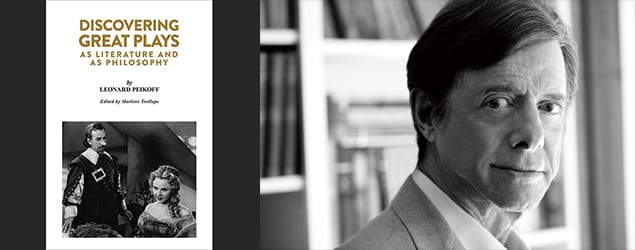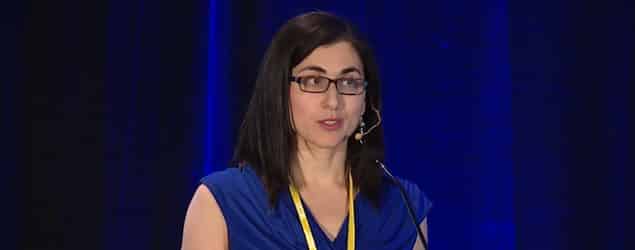Editor Marlene Trollope Discusses Discovering Great Plays by Leonard Peikoff

“Editing a live presentation for print publication is like translating from one language to another,” said Marlene Trollope, editor of Discovering Great Plays: As Literature and As Philosophy by Leonard Peikoff. “And, as the saying goes, ‘Something may be lost in translation.’ My challenge was to keep that loss to a minimum.”
Published recently in paperback and Kindle formats, Discovering Great Plays is based on a series of lectures in which Peikoff explains how to understand, judge and savor the values offered by great drama. Plays discussed include:
- Antigone by Sophocles
- Othello by Shakespeare
- Le Cid by Corneille
- Don Carlos by Schiller
- An Enemy of the People by Ibsen
- Saint Joan by Shaw
- Monna Vanna by Maeterlinck, and
- Cyrano de Bergerac by Rostand.
“I do love to edit, to help keep the author’s voice and message clear,” Trollope said. “I’ve done it all my life. I’ve edited two speech-to-print books previously. Objectively Speaking: Ayn Rand Interviewed, which was co-edited with Peter Schwartz and published in 2009, contains edited transcripts of interviews given between 1932 and 1981. Then in 2014 came Teaching Johnny to Think: A Philosophy of Education Based on the Principles of Ayn Rand’s Objectivism, which is an edited version of Dr. Peikoff’s philosophy of education course.” (The recorded version of that course is available on ARI Campus here.)
“After Objectively Speaking, I simply asked Dr. Peikoff if I could prepare his education and drama courses for print, and he agreed,” Trollope recalled. “The original drama course in 1993 dealt with seven plays, but after much badgering and by popular demand he agreed to offer a separate lecture the next year on Cyrano de Bergerac by Edmond Rostand, employing the same tools of analysis. He had originally omitted that play because he knew it was very familiar to Objectivists. Discovering Great Plays incorporates his analysis of all eight plays.”
Trollope hopes the book will provide readers with practical tools to guide their own exploration of great drama. “Dr. Peikoff has given us a way to get an immense amount of pleasure out of reading a play, as against seeing it performed. He makes it clear that his course is not about discovering drama as drama. Playwrights write with the intent of putting their works on the stage. When you only read the play, you miss the physical action, the physical conflict, and you don’t have all the cues you would have seeing it staged. Instead, this course is about discovering plays and the pleasures they provide as literature and as philosophy — hence the subtitle of his course and the book.”
“Dr. Peikoff’s approach is a model for literary criticism, and I believe it’s unique in the field,” Trollope said. “His structure is very clear.” For each play under discussion, Peikoff provides an introduction to the playwright and his period, identifies the essence of the action in a one-sentence “plot-theme,” describes the plot development, identifies the main characters and their motivations, defines the abstract message of the play’s events through a statement of theme, and explains the play’s deepest philosophical meaning.
“He did an incredible amount of research selecting these specific plays and playwrights and read copious amounts of criticism in preparation for the course. He does detail what his procedure was,” Trollope said. “He’s a master integrator, and this course is a glowing example of that. It is a beautiful framework for tackling plays on your own, and making other valid evaluations in life. That’s a huge value, and I think it’s marvelous.”
Preparing the manuscript was a challenge. Dina Schein Federman prepared the first transcript, after which Trollope went through it many times, listening to every word and comparing it to what was on the page, removing all the “uhs” and “ers” while emphasizing the underlying logic. “I wanted the content to shine, of course,” Trollope said. “But I didn’t want to over-formalize the text and alter his enthusiasm or speaking style. I thought an overly academic tone would undercut the personal glimpses into his life, his preferences, and his responses to drama. At one point, Dr. Peikoff says: ‘I’ve enjoyed this course more than anything I’ve given so far — it’s just pure pleasure for me.’ I wanted that to come through on the page.”
Archaic language in the original plays was also a challenge. “Only one of the plays he discusses was originally written in modern English,” she said, “so he did a clever thing — he would paraphrase or rephrase speeches from the plays as if he were quoting, to make the meaning clear to his listeners. Since these were not direct quotes, I decided to indicate when this was happening through italics.”
Ayn Rand Institute professionals helped finish the transcript. “You can become blind to errors after going over a manuscript a hundred times,” she said. “Donna Montrezza and Simon Federman were greatly helpful. Their fresh eyes really perfected the manuscript.”
Trollope believes the book offers unique value that could be useful in academic settings. “He makes esthetic evaluations by comparing literary elements within and across plays and determining which is the best play esthetically. The best philosophically is determined by how well a total philosophy is included in the play. The best overall is the one in which the playwright has integrated art and philosophy most successfully. If that’s ever been done in a drama course in the world, I’d be amazed.
“I learned a lot from this course. For instance, An Enemy of the People by Ibsen is a play that I thought I knew well, but he opened up new layers of symbolism that I had overlooked. I also found his Q&A sessions treasure troves of information that wouldn’t fit into the main lectures. One answer I recommend includes his brief discussion of style — some of its elements and what to look for in evaluating them. His suggestions for other playwrights and further works to explore provide masses of valuable information as well.”
Trollope is proud of the finished work. “I think I met the challenges as well as I was able,” she said. “I got so much pleasure from this project — it was a joy to do.”
You can purchase Discovering Great Plays here. (The original lecture courses, presented as Eight Great Plays, are available on ARI Campus here.)



